Physical Address
304 North Cardinal St.
Dorchester Center, MA 02124
Physical Address
304 North Cardinal St.
Dorchester Center, MA 02124

Slippers can be adorable for little feet, but are they really the best choice for babies? Are slippers good for babies? Here’s a look at the pros and cons of slippers for babies, to help you decide if they’re right for your child.
During their first year, babies are learning to develop balance and coordination. Bare feet allow them to feel the floor better, which helps with sensory development and strengthens the muscles in their feet and ankles. This can make learning to walk easier and more natural.
Additionally, barefoot walking may help with:
Grip: Feeling the floor with their bare feet helps babies grip the ground and prevent slips and falls.
Sensory Development: Bare feet allow babies to feel different textures and sensations, which is important for brain development.
Foot Strength: Strong foot muscles are important for overall balance and coordination.
While barefoot is generally best for learning walkers, there are some situations where slippers might be appropriate. Here are a few things to consider:
If your home has cold floors, slippers can help keep your baby’s feet warm.
If you take your baby outside on a hot day, slippers can protect their feet from hot pavement.
In some cases, a doctor may recommend slippers for a medical condition.
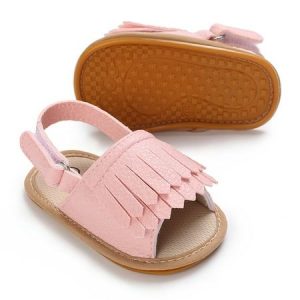
If you do decide to use slippers for your baby, it’s important to choose safe ones. Here are some tips:
Size: Make sure the slippers fit snugly but comfortably. Loose slippers can be a tripping hazard.
Material: Choose soft, breathable materials like leather or fleece. Avoid slippers with hard soles or that can irritate your baby’s skin.
Grip: Look for slippers with non-skid soles to help prevent slips and falls.
There are other ways to keep your baby’s feet warm and protected without using slippers. Here are a few ideas:
Socks: Socks are a great option for keeping your baby’s feet warm. Choose socks with grips on the bottom to prevent slipping.
Booties: Booties are similar to socks, but they often come higher up on the ankle. They can be a good option for colder weather.
Footwear for Outdoor Use: If you’re taking your baby outside, choose shoes or sandals that are appropriate for the weather.
When it comes to footwear for babies, safety and development should be your top priorities. Barefoot is generally the best choice for learning walkers, but slippers can be an option in some cases. If you do choose to use slippers, be sure to choose safe ones that fit well and provide good grip.
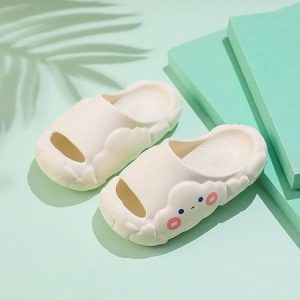
Ultimately, the decision of whether or not to use slippers for your baby is up to you. Here are some additional factors to consider:
Age of Your Baby: If your baby is just starting to crawl or walk, barefoot time is especially important. You can introduce slippers later when they’re more mobile.
Comfort: Pay attention to your baby’s reactions. If they seem uncomfortable or try to pull the slippers off, it might be best to avoid them.
Activity Level: If your baby is very active, slippers may not stay on their feet and could become a tripping hazard.
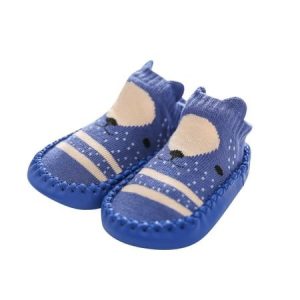
No matter what footwear you choose for your baby, it’s important to monitor them closely. Here’s why:
Slipper Safety: Check the fit of slippers regularly to ensure they aren’t too loose or tight. Loose slippers can cause tripping, and tight slippers can irritate your baby’s feet.
Developmental Milestones: Watch for any delays in your baby’s walking development. If you have concerns, talk to your pediatrician.
Your pediatrician is a great resource for information about your baby’s development, including their feet. They can advise you on the best footwear choices for your baby’s specific needs.
Here are some questions you can ask your pediatrician:
By considering the pros and cons of slippers, along with your baby’s individual needs, you can make the best decision about footwear for your little one.
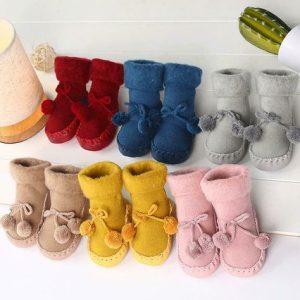
Barefoot time is important for babies’ development. Here are some tips for enjoying safe barefoot time for your baby:
Provide a safe play space: Ensure your baby’s play area is free from sharp objects or hazards.
Supervise them closely: Watch your baby when they’re barefoot to avoid them stepping on anything harmful.
Consider the temperature: If the floor feels cold, socks or booties may be a better choice than slippers.
When choosing any footwear for your baby, prioritize safety and good fit. Look for soft, breathable materials and soles that provide good grip. Here are some questions to ask your pediatrician:
By considering the information above and consulting your pediatrician, you can make the best decision about footwear for your baby’s healthy development.
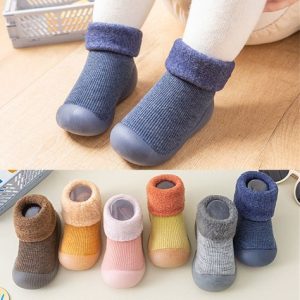
Shoes are important for protecting your baby’s feet once they start walking outdoors regularly. Consult your pediatrician for guidance on choosing the right shoes for your baby’s needs.
By considering the information above and consulting your pediatrician, you can make the best decision about footwear for your baby’s healthy development.
There are many factors to consider when choosing footwear for your baby. Barefoot time is important for their development, but slippers can be helpful in some situations. When choosing slippers, prioritize safety and good fit. Consulting your pediatrician is always recommended to get specific advice for your baby’s needs.